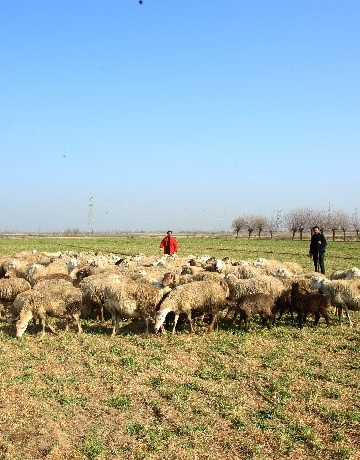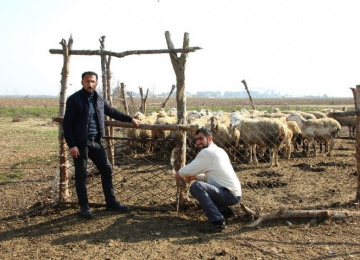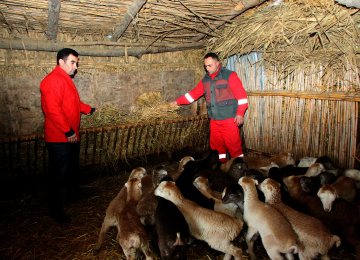The province of Aghjabedi in Azerbaijan is a rural and heavily agricultural district. Growing crops and livestock farming are main economic activities that locals are engaged in here. Orkhan Naghiyev was born and grew up in the village of Hajibadalli, becoming an economist by education. Today, Naghiyev lives there with his family. His wife is a schoolteacher, but she is currently a stay-at-home mom, while their seven-year-old daughter and 10 year-old son go to primary school in the village.
After completing his military service, Naghiyev left for Russia to do business. After some years of selling goods in Moscow, he decided to return to Azerbaijan and settle in his village. Eventually, he began cultivating cotton and other crops, rotating them on his family’s small plot of land.
As a customer of Turan Bank, Naghiyev used to take micro loans to cover his farming expenses. One day, he found out from the Bank about the AMFA/EU project, which was looking for micro-entrepreneurs who had the potential to grow their business. “Many people, including some of my fellow villagers, immediately applied to AMFA/EU project. A few weeks later, I received a call from AMFA that I was one of those who were selected to attend financial literacy and business planning workshops,” recalls Orkhan Naghiyev.
Naghiyev says that those workshops helped him to put together his own business plan and apply for a grant. Fortunately, at the end of the selection process, he and three of his fellow villagers were among those who were selected for grants.
Following the business planning course, AMFA also organized a Cooperative Development course. At that workshop, Naghiyev found out more about the business ideas of the others in his village and discovered that they all had pretty much the same idea of starting small-scale sheep husbandry. “At the Cooperative Development workshop, we learned how to set up a cooperative, how to build trust among members, how to develop by-laws of cooperation, how to define common cost items, how to organize procurement, sales, materials and labor resources to increase efficiency, and so on. This knowledge was indispensable,” says Naghiyev.
In fact, the workshop was designed to require participants to work in groups according to their chosen activities to simulate the cooperative development process and learn by doing, at the same time. During the course, Naghiyev and his three fellow villagers decided to keep sheep together. Basically, they started developing a business plan for a future cooperative during the workshop.
Once they received the grants, the four established a cooperative to manage their sheep farming. Together, they bought 40 sheep as their starting flock. Since then, the four have been working together to maintain sheep farming processes, such as cleaning, feeding and care. They are also in the process of formally registering their cooperative.
Although COVID-19 restrictions presented many logistical challenges, Orkhan says “the co-op was able to double its flock to 80 sheep within a year”. So far, they have sold 18 sheep to cover family needs and other expenses, and 62 sheep remain in the flock. Plans are to expand to 100 sheep, which will make the co-op self-sufficient to keep growing. The four are thinking big and dream of supplying Baku markets with fresh mutton.
“Had there been no grants, it would not have been possible to start our farm,” Naghiyev says. “I would like to see AMFA encourage entrepreneurs to participate as clusters in future projects. The ability to manage work in a cooperative form is as important as the workshops the project has delivered and the grants it issues for starting new businesses.”
AMFA has been implementing the European Union-funded “Accelerating Development of Sustainable Micro-entrepreneurship in Rural Regions of Azerbaijan” (ADSMIRRA) Project in the economic regions of Ganja-Gazakh, Guba-Khachmaz, Shaki-Zagatala and Aran over 2018-2021. The Project aim has been strengthening the potential of micro and small entrepreneurs in rural areas by providing workshops in financial literacy, business planning, running cooperatives, mentoring, allocating capital for starting or expanding micro businesses, and more. Altogether, the Project has supported the launch of 37 start-ups, the expansion of 76 micro businesses and the generation of 125 jobs in rural Azerbaijan, allowing 202 families to increase their monthly income and 3 cooperatives to be established.



